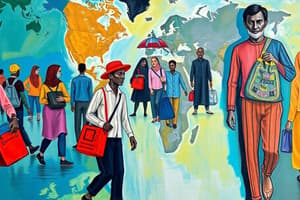Podcast
Questions and Answers
What is a consequence of labour market discrimination?
What is a consequence of labour market discrimination?
- Increased social cohesion
- Inequality, poverty, and social exclusion (correct)
- Improved matching between labour and capital
- Reduced inequality and poverty
What can lead to mismatches between labour and capital?
What can lead to mismatches between labour and capital?
- Globalisation and migration (correct)
- Effective anti-discrimination laws
- Reduced inequality and poverty
- Improved matching between labour and capital
What is a result of globalisation and migration?
What is a result of globalisation and migration?
- Improved labour market opportunities
- Exacerbation of existing inequalities (correct)
- Reduced inequality between developed and developing countries
- Increased social cohesion
What is critical for economic growth and development?
What is critical for economic growth and development?
What can help to promote greater equality and social cohesion?
What can help to promote greater equality and social cohesion?
What is a consequence of globalisation on wealth distribution?
What is a consequence of globalisation on wealth distribution?
What is a potential negative consequence of remittances on local economic development?
What is a potential negative consequence of remittances on local economic development?
What is a potential benefit of cultural diversity?
What is a potential benefit of cultural diversity?
What is a potential negative consequence of international trade?
What is a potential negative consequence of international trade?
What percentage of the total wealth is held by the top 1% of the population?
What percentage of the total wealth is held by the top 1% of the population?
Flashcards are hidden until you start studying
Study Notes
Wealth Distribution
- Inequality in wealth distribution refers to the unequal distribution of resources, assets, and income among individuals and groups within a society.
- Globalisation has exacerbated wealth inequality, with the wealthy benefiting more from global trade and investment.
- Top 1% of the population holds a significant percentage of the total wealth, while the bottom 50% holds a relatively small percentage.
Remittances
- Remittances refer to the money sent by migrant workers back to their families or communities in their home countries.
- Remittances can contribute to poverty reduction and economic development in the home country.
- However, remittances can also create dependency on foreign income and undermine local economic development.
Cultural Diversity
- Globalisation and migration have led to increased cultural diversity in many countries.
- Cultural diversity can bring benefits such as increased innovation, creativity, and economic growth.
- However, it can also lead to cultural clashes, social tensions, and challenges to social cohesion.
International Trade
- Globalisation has led to increased international trade, which can create new opportunities for economic growth and development.
- However, it can also lead to job losses, exploitation of workers, and environmental degradation.
- International trade can exacerbate existing inequalities, particularly between developed and developing countries.
Labour Market
- The labour market refers to the supply and demand for labour in a particular economy.
- Globalisation and migration have led to changes in the labour market, including increased competition for jobs and downward pressure on wages.
- Labour market discrimination, such as discrimination based on race, gender, or nationality, can also lead to inequality and poverty.
Matching between Labour and Capital
- The matching between labour and capital refers to the process of matching workers with jobs and capital with investment opportunities.
- Globalisation and migration can lead to mismatches between labour and capital, particularly in the context of skill shortages and labour market discrimination.
- Effective matching between labour and capital is critical for economic growth and development.
Labour Market Discrimination
- Labour market discrimination refers to the unequal treatment of individuals or groups in the labour market, often based on characteristics such as race, gender, or nationality.
- Discrimination can lead to inequality, poverty, and social exclusion.
- Policies aimed at reducing labour market discrimination, such as anti-discrimination laws and affirmative action, can help to promote greater equality and social cohesion.
Inequality, Globalisation, and Migration
- Globalisation and migration can exacerbate existing inequalities, particularly between developed and developing countries.
- Inequality can also lead to migration, as individuals seek better opportunities in other countries.
- Addressing inequality, globalisation, and migration requires a comprehensive approach that takes into account the complex interplay between these factors.
Studying That Suits You
Use AI to generate personalized quizzes and flashcards to suit your learning preferences.




